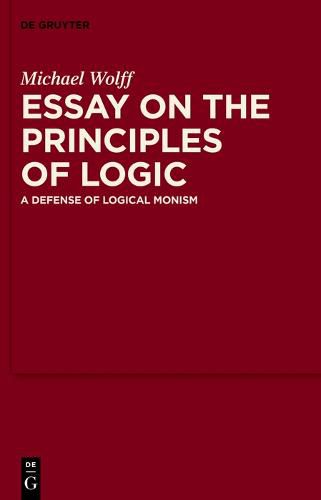Readings Newsletter
Become a Readings Member to make your shopping experience even easier.
Sign in or sign up for free!
You’re not far away from qualifying for FREE standard shipping within Australia
You’ve qualified for FREE standard shipping within Australia
The cart is loading…






This title is printed to order. This book may have been self-published. If so, we cannot guarantee the quality of the content. In the main most books will have gone through the editing process however some may not. We therefore suggest that you be aware of this before ordering this book. If in doubt check either the author or publisher’s details as we are unable to accept any returns unless they are faulty. Please contact us if you have any questions.
Wolff's book defends the Kantian idea of a "general logic" whose principles underlie special systems of deductive logic. It thus undermines "logical pluralism," which tolerates the co-existence of divergent systems of modern logic without asking for consistent common principles. Part I of Wolff's book identifies the formal language in which the most general principles of logic must be expressed. This language turns out to be a version of syllogistic language already used by Aristotle. The universal validity of logical principles, as well as the translatability of other logical languages into this language, are shown to depend only on the meanings of its logical vocabulary. Part II of the book answers the metalogical question concerning the deductive relation between general logic and special logical systems, which also have their own (less general) principles. This part identifies the rules according to which logical rules can be derived from principles. The main result of the book is that the highest principles of logic and metalogics are provided by the syllogistic, when properly understood.
$9.00 standard shipping within Australia
FREE standard shipping within Australia for orders over $100.00
Express & International shipping calculated at checkout
This title is printed to order. This book may have been self-published. If so, we cannot guarantee the quality of the content. In the main most books will have gone through the editing process however some may not. We therefore suggest that you be aware of this before ordering this book. If in doubt check either the author or publisher’s details as we are unable to accept any returns unless they are faulty. Please contact us if you have any questions.
Wolff's book defends the Kantian idea of a "general logic" whose principles underlie special systems of deductive logic. It thus undermines "logical pluralism," which tolerates the co-existence of divergent systems of modern logic without asking for consistent common principles. Part I of Wolff's book identifies the formal language in which the most general principles of logic must be expressed. This language turns out to be a version of syllogistic language already used by Aristotle. The universal validity of logical principles, as well as the translatability of other logical languages into this language, are shown to depend only on the meanings of its logical vocabulary. Part II of the book answers the metalogical question concerning the deductive relation between general logic and special logical systems, which also have their own (less general) principles. This part identifies the rules according to which logical rules can be derived from principles. The main result of the book is that the highest principles of logic and metalogics are provided by the syllogistic, when properly understood.